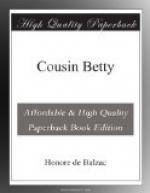“You will see the masterpiece I have just bought; it is to be brought home, and that dear Wenceslas is to come with the dealer.—The man who made that group ought to make a fortune; only use your influence to get him an order for a statue, and rooms at the Institut——”
“How you run on!” cried her father. “Why, if you had your own way, you would be man and wife within the legal period—in eleven days——”
“Must we wait so long?” said she, laughing. “But I fell in love with him in five minutes, as you fell in love with mamma at first sight. And he loves me as if we had known each other for two years. Yes,” she said in reply to her father’s look, “I read ten volumes of love in his eyes. And will not you and mamma accept him as my husband when you see that he is a man of genius? Sculpture is the greatest of the Arts,” she cried, clapping her hands and jumping. “I will tell you everything——”
“What, is there more to come?” asked her father, smiling.
The child’s complete and effervescent innocence had restored her father’s peace of mind.
“A confession of the first importance,” said she. “I loved him without knowing him; and, for the last hour, since seeing him, I am crazy about him.”
“A little too crazy!” said the Baron, who was enjoying the sight of this guileless passion.
“Do not punish me for confiding in you,” replied she. “It is so delightful to say to my father’s heart, ’I love him! I am so happy in loving him!’—You will see my Wenceslas! His brow is so sad. The sun of genius shines in his gray eyes—and what an air he has! What do you think of Livonia? Is it a fine country?—The idea of Cousin Betty’s marrying that young fellow! She might be his mother. It would be murder! I am quite jealous of all she has ever done for him. But I don’t think my marriage will please her.”
“See, my darling, we must hide nothing from your mother.”
“I should have to show her the seal, and I promised not to betray Cousin Lisbeth, who is afraid, she says, of mamma’s laughing at her,” said Hortense.
“You have scruples about the seal, and none about robbing your cousin of her lover.”
“I promised about the seal—I made no promise about the sculptor.”
This adventure, patriarchal in its simplicity, came admirably a propos to the unconfessed poverty of the family; the Baron, while praising his daughter for her candor, explained to her that she must now leave matters to the discretion of her parents.
“You understand, my child, that it is not your part to ascertain whether your cousin’s lover is a Count, if he has all his papers properly certified, and if his conduct is a guarantee for his respectability.—As for your cousin, she refused five offers when she was twenty years younger; that will prove no obstacle, I undertake to say.”
“Listen to me, papa; if you really wish to see me married, never say a word to Lisbeth about it till just before the contract is signed. I have been catechizing her about this business for the last six months! Well, there is something about her quite inexplicable——”




